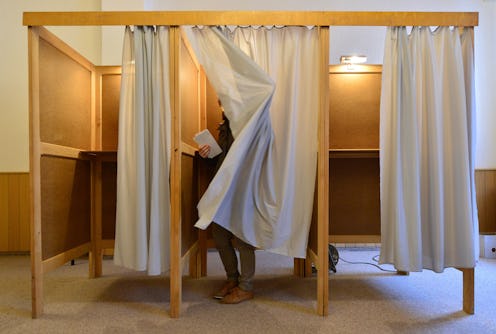News
Rhode Island Is Small, But Not Down For The Count
Rhode Island may be a small state, but don't count it out just yet — Little Rhody still has a lot to offer during next week's primary election. In fact, the state has been attracting both positive and negative attention for this upcoming primary, putting Rhode Island in an unfamiliar position as the race to the nomination is usually all but over come April. But as the pathway to the convention tightens with each delegate counting for something, even little Rhode Island has gotten its turn in the campaign spotlight. Which begs the question — is Rhode Island winner take all?
For a quick briefing, Rhode Island's delegates (31 for the Democratic candidates, 19 for the Republicans) are awarded proportionately. There is a small catch, though: Rhode Island operates off of votes in the districts, so their delegates are given out based on results in each particular district, as opposed to statewide. Likewise, in the event that three candidates get over 10 percent in a congressional district, they each will be awarded one delegate. (This would only be the case for the Republican candidates, of course.) But if any candidate manages to receive over 67 percent of the vote in a district, they will get all three delegates accordingly.
As unusual as this primary race has been, however, candidates have been eyeing the state for a couple of different reasons. One being Rhode Island's cultural likeness to neighboring Massachusetts. In early March, Bay State voters saw GOP front-runner Donald Trump take a sizable victory over his opponents, while Hillary Clinton only narrowly defeated Bernie Sanders. Sharing much of the same demographics and issues, Rhode Island could likely be expected to go the same way — though it will be telling if the percentages shift significantly, demonstrating a nationwide change in opinion toward the candidates. Accordingly, former President Bill Clinton is stumping on behalf of his wife, and Republican candidate John Kasich will also pass through the state.
Rhode Island has also attracted some negative attention for being similar to another state: Arizona. The Grand Canyon State garnered nationwide criticism earlier in the primary season when it shut down hundreds of polling locations and caused unrest as voters had to wait in massive lines or miss casting a ballot at all. Now Rhode Islanders are afraid of the same fate as The Rhode Island Board of Elections announced it would only open 144 of the 419 polling locations available in the state. This move, like in Arizona, is to cut costs. And though voters are hoping it doesn't cost them a chance at the polls, Rhode Island seems confident that it can deal with the numbers, relying on low average turnout.
With this in consideration, Rhode Island becomes even more important, regardless of size or delegate allocation. It will be interesting to see if it falls in line with its neighbor Massachusetts, and hopefully, stays clear of the pitfalls voters experienced in Arizona.
